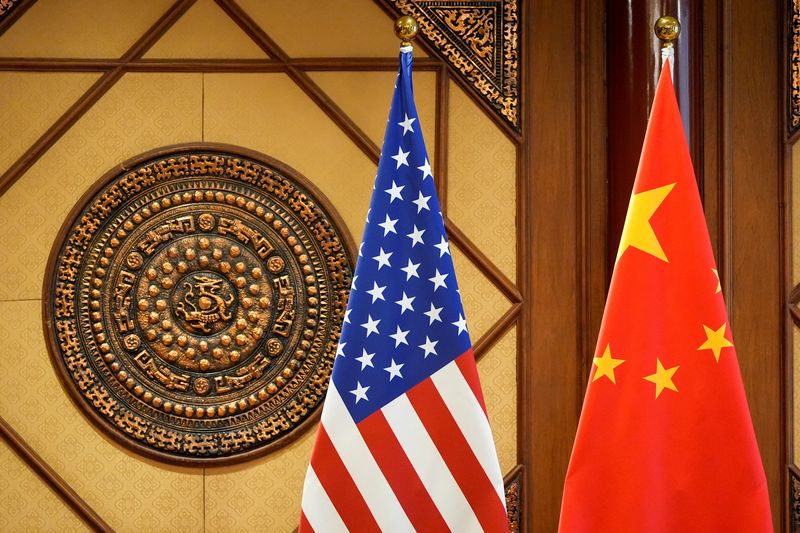By Michael Martina
WASHINGTON (Reuters) - A U.S. congressional committee on China has asked leading research university Georgia Institute of Technology to detail its collaboration with a Chinese university facing U.S. government restrictions due to its alleged ties to the country's military.
Georgia Tech partnered with China's northeastern Tianjin University on cutting edge technologies despite its documented ties to the People's Liberation Army (PLA), John Moolenaar, the new Republican chairman of the House of Representatives' select committee on China, wrote in a letter on Thursday to the U.S. school's president Angel Cabrera.
But the Georgia Tech scientist who led the project defended the research, saying all the results were available to the public, that it had passed extensive legal reviews, and that only a small portion of the funding came from the Georgia Tech Research Institute (GTRI), which is heavily sponsored by the Pentagon.
The letter noted that Tianjin University and numerous affiliates had been added in 2020 to the Commerce Department's export restrictions list for actions contrary to U.S. national security, including trade secret theft and research collaboration to advance China's military.
"While Georgia Tech is now prohibited from exporting sensitive technologies to Tianjin University due to the Entity List's prohibitions, it has collaborated with Tianjin University and at least one other PLA-linked entity on developing sensitive technologies," Moolenaar said.
The Tianjin research center is affiliated with a Chinese company with subsidiaries that supply the PLA, the letter said.
A Georgia Tech press release from January said its researchers based in Atlanta and at the Tianjin International Center for Nanoparticles and Nanosysms had created the world's first functional semiconductor made from the nanomaterial, graphene, which it said could lead to a "paradigm shift" in electronics and yield faster computing.
The U.S. and China, in the midst of an intense geopolitical and scientific rivalry, both view semiconductors as a strategic industry with civilian and military uses, including quantum computing and advanced weapons systems.
A spokesperson from Georgia Tech said it welcomed the congressional inquiry, but that GTRI "does not have a collaboration, research partnerships, or provide any funding to Tianjin University."
"We are continuously monitoring the evolving relationships between China and the United States and have implemented additional procedures and protocols to ensure security and maintain vigilance," Abbigail Tumpey, the spokesperson told Reuters in an email.
In a published article, researchers credited financial support from GTRI, which counted the Defense Department and the U.S. military as customers for more than 90% of its research in fiscal year 2023, according to its latest annual report.
Moolenaar said Georgia Tech's collaboration with Tianjin University raised questions about its entity list compliance, and asked Cabrera to thoroughly disclose all of its joint work.
GTRI, Tianjin International Center for Nanoparticles and Nanosystems, and China's embassy in Washington did not respond immediately to Reuters' requests for comment.
Walter de Heer, the Georgia Tech professor who directed the program, told Reuters that only one Atlanta-based student had derived funding from GTRI for "nonproprietary" research related to the collaboration, which involved reproducing samples made in Tianjin.
He said deteriorating U.S.-China relations had derailed what had been a fruitful scientific endeavor with Chinese researchers. He said the research was still about a decade away from viable implementation, but that he had been unable to obtain U.S. government or private sector funding for follow-on research despite its promise.
"Everything I'm doing is public domain and open source," De Heer said.
The letter marks one of the first actions Moolenaar has taken as head of the bipartisan committee, a post he assumed in April after former Representative Mike Gallagher left Congress. No Democrats on the committee signed the letter.
The U.S. Justice Department under the Biden administration ended a Trump-era program called the China Initiative intended to combat Chinese espionage and intellectual property theft, but which critics had said spurred racial profiling toward Asian Americans and chilled scientific research.

Still, U.S. agencies and Congress have stepped up scrutiny of China's state-sponsored influence and technology transfers at American colleges and universities, concerned that Beijing uses open and federally funded research environments in the U.S. to circumvent export controls and other national security laws.
Various congressional bodies have recommended stricter China-related measures be added to the Higher Education Act of 1965 that requires U.S. colleges and universities that receive federal funding to disclose foreign ownership, control, gifts and contracts.